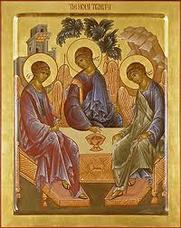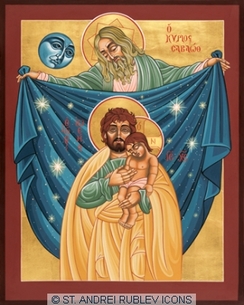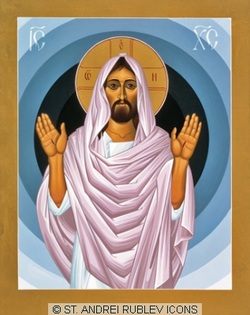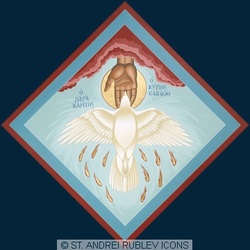 In the years when I was teaching high school theology I taught the Sacraments to sophomores. During the chapter on Marriage we would discuss relationships, which of course would center on a discussion about love and what it is. I would present some definitions of love, most of which are honestly not all that appealing. For example, in psychological books love is often defined as something like "warm personal regard." I had these images of a man on bended knee before his beloved telling her he had warm personal regard for her and asking her to marry him! Not overly romantic, to say the least! The dictionary says love is "affection based on admiration or benevolence”, and goes on to say it is “a warm attachment or devotion." We may be getting closer, but this still does not stir my blood. The best definition of love I know comes from St. Augustine who says something like this: The Holy Trinity is the eternal exchange of love between Father, Son, and Holy Spirit which is extended out to us. What this is saying is that God is love; if you want to know what love is, get to know God. In other words, love is mystery, but it is accessible to us through our relationship with God. Love, therefore, is who and what God is. I hope you are not surprised to find that I defined love by saying “who” the Trinity is. The very nature and essence of God is love. We read this in 1 John 4:7 and the verses which follow. Love is not easily defined, but it is described with every word in Scripture. And the Church rejoices in this love by celebrating the Feast of the Holy Trinity this coming Sunday. The Trinity is God, Three Persons in One God: the Father who is the Creator, the Son who is the Redeemer, and the Holy Spirit who is the Sanctifier. This reality is what we call an absolute mystery: it is a mystery the depths of which can never be plumbed by humans during this life. But St. Augustine gives us insight into what it means to say that the Trinity is bonded by love and therefore God is love. It is something we can grasp even though how this is remains a mystery.  So what is love? Love is the action of God as Father when He created all that exists for us so that we may be happy and so that we may be forever in relationship with Him. He made us so that we may be loved. The very nature of love is that it has to be mutual. Without an object of one's love, there is no love at all. One cannot love in a vacuum; there has to be a beloved. In other words, as St. Augustine's definition clearly implies, love is mutual. It has to be given to a beloved in a mutual exchange. Love is the driving force behind the Father giving us forgiveness after we chose to reject love by choosing sin. It is what inspired the Father to send all sorts of leaders and prophets (in Old Testament times) to try to guide His people again and again as they became a nation. Love is what compelled the Father to make covenants, which are eternal agreements based on love, with His people so as not to lose any of them. The Father must have wept every time His love was rejected by His people when they strayed to paganism or when their enemies overtook them, and He must have rejoiced every time they returned to Him or when they stood firm in their faith. Love is the action of the Father in giving us His Son. Love is the Incarnation: the Son came into the world to become one of us and live among us. Love is the Son of God becoming enfleshed so that He could begin the Kingdom of God among us, and then suffer, die, rise, and be glorified so that we may have salvation. Love is the action behind every one of the miracles performed by Jesus. It was love that healed and it was love that preached. It was love which wept over Jerusalem and which wept over the death of Lazarus and no doubt wept in secret over the Pharisees and Sadducees who refused His love and friendship. I have always been sure that Jesus often wept when He would go apart to pray to His Father. He must have felt so much of the pain which comes from love. That is, because of His love for all His people, He must have suffered much during His ministry when they would reject Him and His message of love.  Love is the Father letting His Son go to the cross to die a horrifying death for us. Theologians tell us that God (referring here to the Father) cannot suffer pain. True, He cannot be diminished by pain, but God is compassion and love, therefore He does suffer. There is no way God could be out of touch with suffering. If He was, He would not have chosen it as the way to redeem us, which is the ultimate act of love of both the Father and the Son. I simply cannot imagine our Father blithely watching His Son die on the Cross without weeping copious tears. (To anthropomorphize God, or to portray Him with human attributes, is the only way we can conceive of how He might suffer.) I believe that God weeps when we weep. When His children are in pain He no doubt weeps with us, such as after a calamity like the one which just befell the people of Moore, Oklahoma or the people of West, Texas. Suffering is a mystery, but as I said, it must have great value or God would not have chosen suffering to show us His love by going to the cross. That He joined in our pain tells me that He wants to be in it with us, not simply observing it from afar. I do not pretend to understand why we suffer or why some suffer more than others. But I do know those who suffer are close to God because they can relate most to the suffering of His Son and He can relate to what they are going through, having experienced it in this life.  Love is the Holy Spirit coming down upon His people at Pentecost to give birth to a new community. Love is the Spirit coming to His people through the sacraments, especially because they unite us to one another. Love is how we become one body in Baptism. It is love which binds us all together as the Communion of Saints; love keeps us bound forever to every baptized person on earth, in Purgatory, or in Heaven. It is love which gives us graces through all the other sacraments. It is love through the Holy Spirit which gives us graces as we pray for them, or as we need them. It is the love of the Holy Spirit which comforts, consoles, teaches, supports, empowers, and guides us. Every grace is a gift of love. I hope you can see why I am partial to the definition of the Trinity given to us by St. Augustine. It is love which "glues" the Trinity together, and it is love which the Trinity offers to us so that we may enter into the very midst of God. Like Moses enveloped in the cloud on Mt. Sinai, God wants to enfold us in His love. Life is very strange and mysterious and sometimes quite confounding, but it is also a gift of love to us. Life is a wonderful adventure, filled with joys and sorrows, but it is never lived alone. God is always with us, extending His love, the love of the Trinity, to us. Therefore let us give thanks as we celebrate the feast of the Holy Trinity. While the Trinity is a mystery to us and we can never understand how we have one God in three Persons, we can "understand" love with our hearts even if we cannot understand with our intellect. In other words, we can simply be who we are in the love of the Trinity. If we accept this love, we will find that loving others becomes easier and easier because we cannot contain all that love without it spilling over. May we have joy knowing our God is an eternal exchange of love between the Father, Son, and Holy Spirit extended outward to us! May we be able to accept the love given us by the Trinity, allowing that love to expand our own hearts outward towards others! May we have joy in celebrating the Feast of the Holy Trinity! Let us let His Heart speak to our heart! And let us continue to meet in the Heart of the Trinity! Peace! Two great books about love: The Four Loves by C.S. Lewis and Love's Sacred Order by Erasmo Leiva-Merikakis. The icons are Andrei Rublev's Holy Trinity, which is the most famous icon in the world. Next is San Jose Sambra del Padre, followed by The Risen Christ and finally The Paraclete all by Rev. William Hart McNichols. The icons of Fr. McNichols can can be found at http://www.standreirublevicons.com/index.php
David
5/26/2013 09:16:42 am
Yet another inspiring sharing. Thank you. While reading your reflection, more than once I thought to myself "Hey, that's what Fr. Juniper was saying during his homily". When I read the lines where you said that God wants to enfold us in His love, I smiled because I remembered a wee story Juniper shared this weekend. Comments are closed.
|
Heart Speaks to Heart
|

 RSS Feed
RSS Feed

